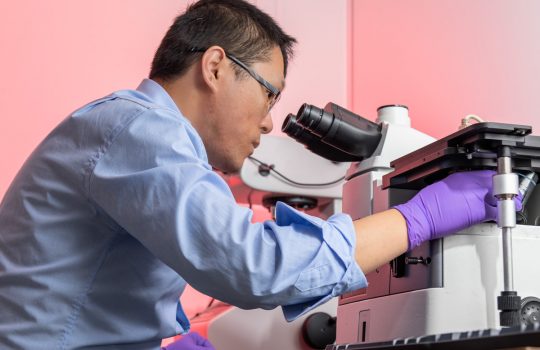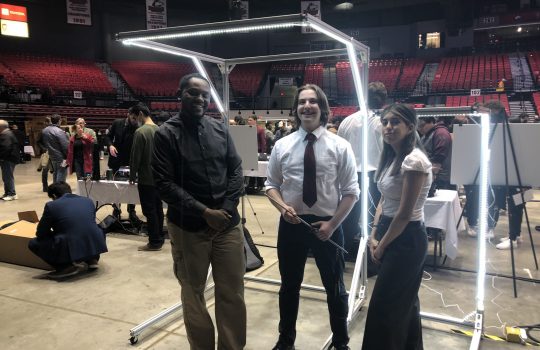It all started in 2018, when Nicholas Pohlman went on sabbatical leave. “I had time to think about the future,” said Pohlman, professor of mechanical engineering at Northern Illinois University. He pondered whether it would be possible to integrate undergraduate students into the existing research partnerships with the U.S. Department of Energy’s Fermi National Accelerator Laboratory.
Now his vision is coming true. A $850,000 grant through DOE’s Reaching a New Energy Sciences Workforce initiative will provide funding for Pohlman’s proposal to bring students from underrepresented groups at NIU to Fermilab. DOE’s RENEW initiative supports internships, training programs and mentor opportunities at 65 different institutions.
“The intention is to train students and hopefully build capacity both at NIU and at Fermilab in the long run,” said Pohlman, who has worked at or with Fermilab for the last sixteen years.
Pohlman designed the NIU program together with Stoyan Stoynev, deputy head of the Magnet Systems Department at Fermilab and NIU colleague Barton Sharp from the College of Business.
“We need to develop new experts in the field of accelerator magnet development. It can be very difficult to find the proper experts,” said Stoynev. “So let’s fix that and start working to develop our own experts and keep the know-how we’ve built at Fermilab.”
The program aims to connect Fermilab scientists and engineers with NIU students from underrepresented communities and offer them a multi-year research experience at Fermilab, located about 35 miles from the NIU campus. Pohlman has invited Fermilab staff to visit the university to meet interested students.
“We want to open the door so that when Fermilab scientists come to NIU for students, they can go directly to the Latino Resource Center or the Center for Black Studies,” said Pohlman. “We want to put students in a space that they feel comfortable visiting and not feel intimidated to be interested in these research opportunities.”
Pohlman and Stoynev also hope that this program will foster innovation in magnet design. “We need new people with new ideas who can push the boundaries of where we are,” said Stoynev.
The students recruited from NIU and selected for this program will be paired with a participating professor from NIU and a research mentor from Fermilab’s Magnet Systems Department. The students will then conduct magnet research and development projects at Fermilab.
Small R&D projects are good opportunities for students because they are scientifically interesting, don’t have as many constraints as the large experiments, and the students will demonstrate a product at the end, explained Vadim Kashikhin, a Fermilab researcher who currently oversees a couple of magnet research projects with student participation.
Some of the research areas that students will work on in this program include high-temperature superconducting solenoids, fiber optics, quench antenna, and machine learning. “These are some examples,” Stoynev said, “though the research mentors and their students will decide on projects based on what kind of interests each student has.”

Fermilab researcher Vadim Kashikhin (left) and Sean Cohan, a former NIU undergraduate, examine the model of a small high-temperature superconducting magnet. Photo: Dan Svoboda, Fermilab
The Fermilab Magnet Systems Department has a history of working with undergraduate and summer research students, though not in any formal program. The benefits of establishing this program include more exposure for both Fermilab and NIU, more accountability on behalf of both the institutions and the students, and funding to maintain the collaboration.
“The big difference is that this time there is a very concrete target,” said Stoynev. “The program will expect preliminary results from each research project in six months, which will help the students progress and focus.”
Pohlman expressed similar excitement for the program’s limited time-frame projects: “Rather than becoming stagnant on a single research question, we’ll apply an entrepreneurial, fail-fast approach to new and interesting questions every six months.”
For the students, the program will provide greater support from mentors at both NIU and Fermilab. It will allow the students and researchers to discuss their research interests before being matched. Previously, students only had brief discussions with their prospective mentors by remote meetings and limited prior knowledge of the project details. The new program strategy will increase student interest and research efficiency, said Stoynev.
Pohlman and Stoynev plan to recruit students starting in January. The program will be able to support about five to eight students per year depending on graduate versus undergraduate participation.
“We plan to host a meet and greet where we mix the interested faculty and students with the interested scientists, and they can sit down and discuss their projects and interests,” said Pohlman. “It will be kind of like scientific speed dating.”
Pohlman, Stoynev and the other Fermilab scientists who are participating in the program are excited about bringing students to Fermilab in the new year.
“I really enjoy passing the beauty of what we do and why science is beautiful on to students,” said Maria Baldini, a Fermilab researcher who currently oversees student researchers. “It’s nice that students get to participate in something that is important for your work and the lab, and they get to have a part and learn about the big picture while building skills.”
Sean Cohan, a previous undergraduate from NIU who has been working with Kashikhin expressed a similar sentiment. “I’ve learned how to use various tools and about particle accelerators,” said Cohan. “I really like working in this laboratory context. I would love to work in this area of expertise in the future.”
Fermi National Accelerator Laboratory is supported by the Office of Science of the U.S. Department of Energy. The Office of Science is the single largest supporter of basic research in the physical sciences in the United States and is working to address some of the most pressing challenges of our time. For more information, please visit science.energy.gov.



